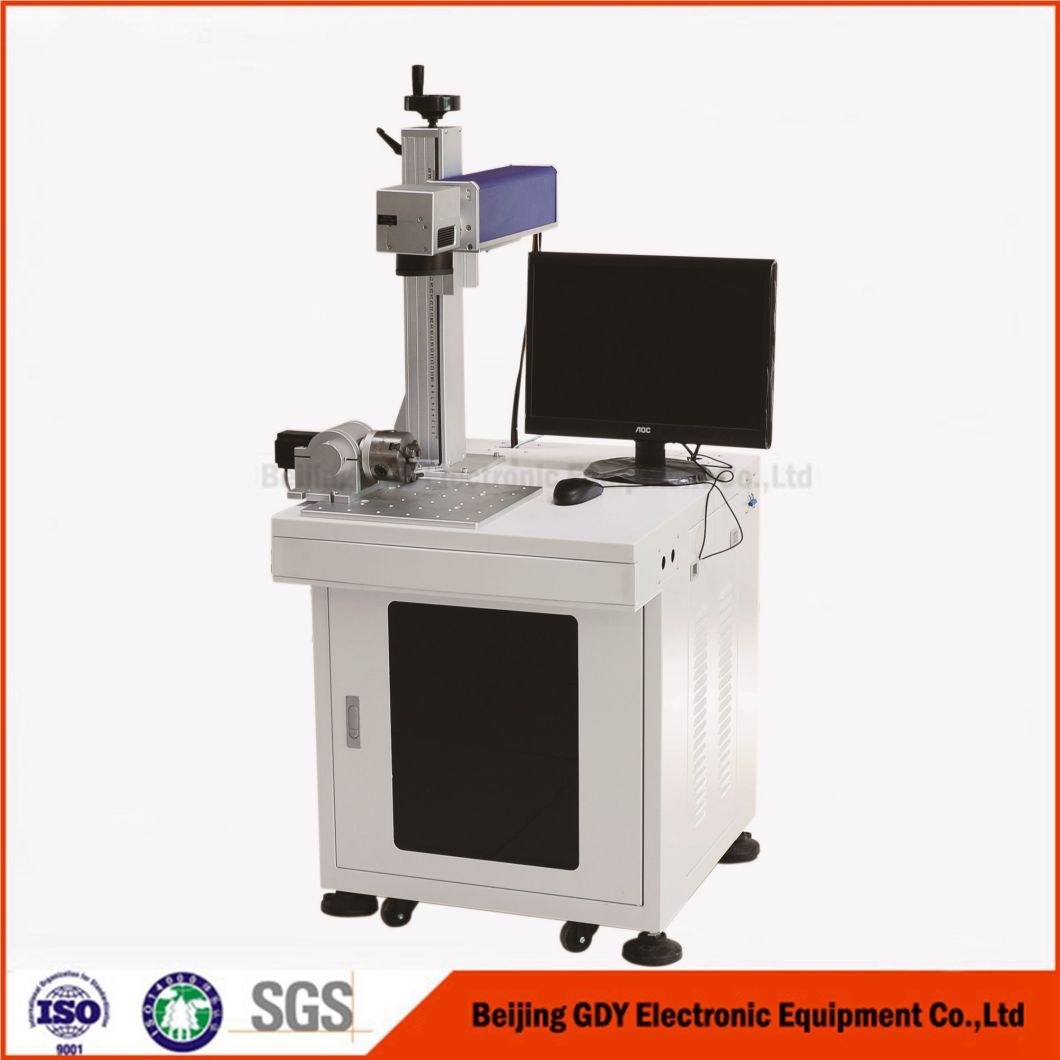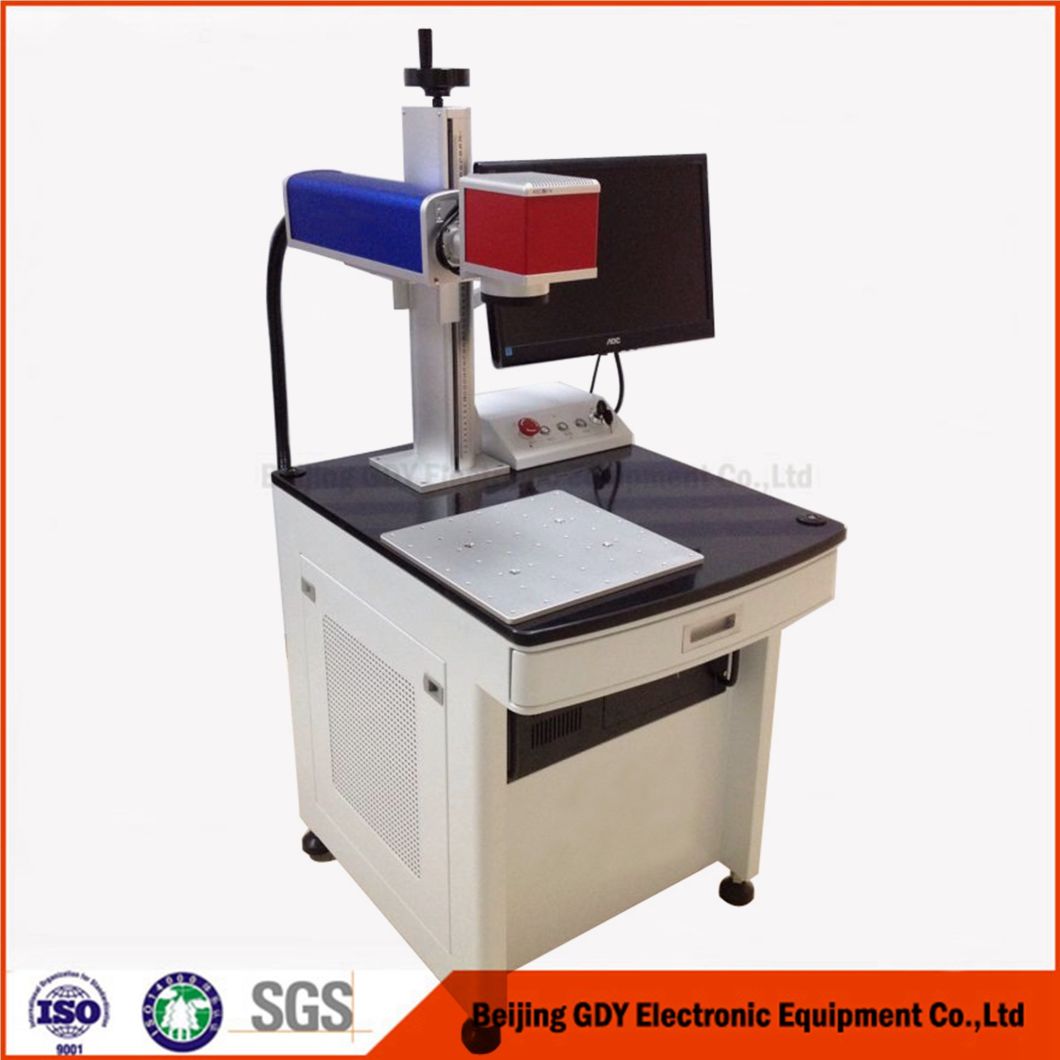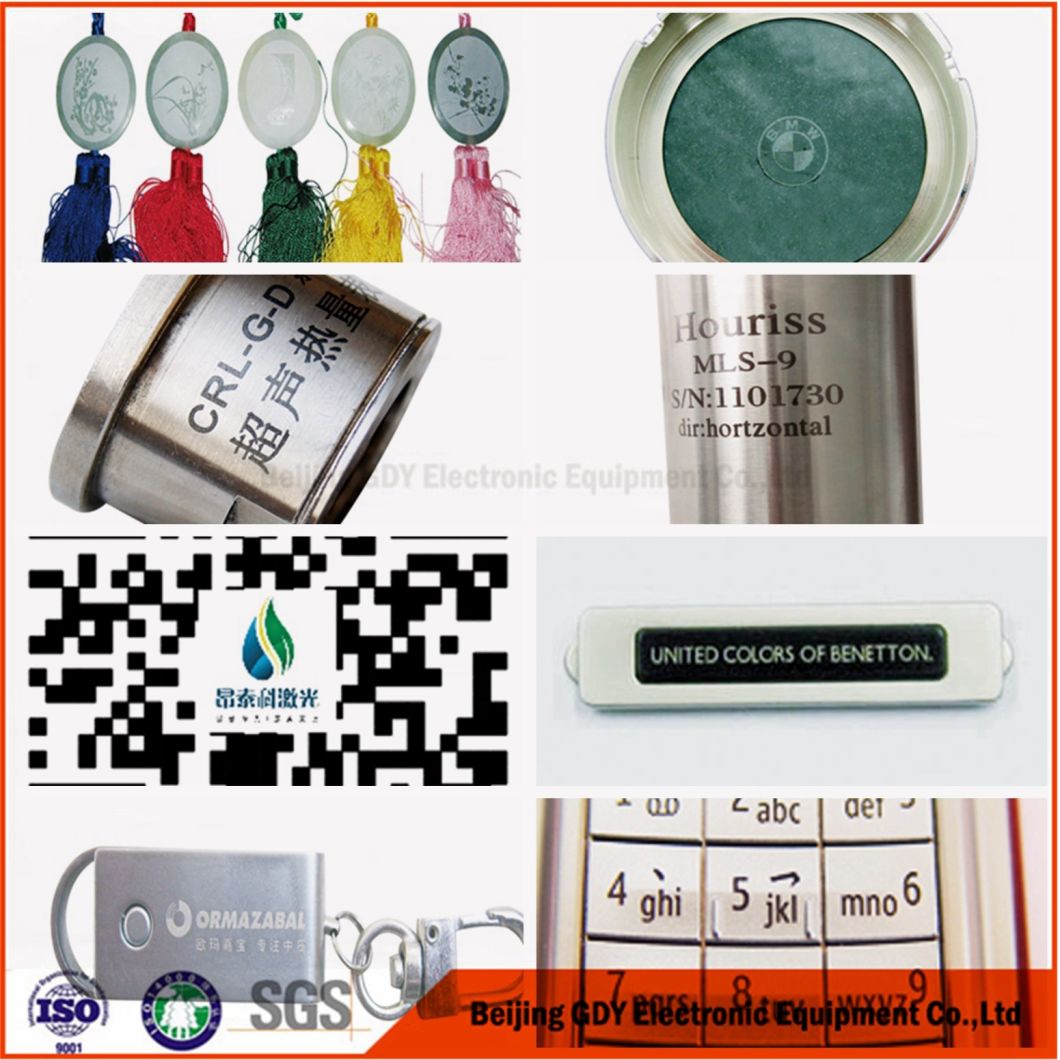Product Introduction        OTX series CNC Economical Table Fiber Laser Marking Machine is the high-tech product which collection of laser, computer, automatic control, precision machinery technology together. This marking machine adopts high performance digital galvanometer scanning system with high speed and high precision, can work for a long time.            OTX series CNC Economical Table Fiber Laser Marking Machine with small size, stable and reliable work, free maintenance, no need water cooling system, low energy consumption, good marking quality and laser output power and frequency is controlled by computer, with special marking software, can conduct real time control of the laser output power and frequency. Marking content can be text, graphics, images etc., and can directly input and edit in proprietary software, also can import the DXF, AI vector text, etc. Advantages 1.Easy of maintenance 2.Compact design 3.High beam quality and high reliability 4.Smooth and good marking result 5.High electrical-optical conversion rate 6.Fast marking speed 7.Stable machine performance and long lifetime Please advise us following inforamtion to recommend you most suitable machine: 1. What's kind of material do you want to mark? metal parts or non metal material? 2. What's the max working area do you need? we can provide you with 110*110mm, 175*175mm, and 220*220mm, 300*300mm, or customized as your demand.
Introduction:
Rigid or flexible
borescopes may be fitted with an imaging or video device. For medical use, similar instruments are called endoscopes.
Uses:
Borescopes are commonly
used in the visual inspection of aircraft engines, aeroderivative industrial
gas turbines, steam turbines, diesel engines, and automotive and truck engines.
Gas and steam turbines require particular attention because of safety and
maintenance requirements. Borescope inspection of engines can be used to
prevent unnecessary maintenance, which can become extremely costly for large
turbines. They are also used in manufacturing of machined or cast parts to
inspect critical interior surfaces for burrs, surface finish or complete
through-holes. Other common uses include forensic applications in law
enforcement and building inspection, and in gunsmithing for inspecting the interior bore of a firearm.
In World War II, primitive rigid borescopes were used to examine the interior
bores (hence "bore" scope) of large guns for defects.[1]
Flexible
borescopes:
A flexible borescope
includes a bundle of optical fibers which divide the image into pixels. It is
also known as a fiberscope and can be
used to access cavities which are around a bend, such as a combustion chamber
or "burner can", in order to view the condition of the compressed air
inlets, turbine blades and seals without
disassembling the engine.
Flexible borescopes
suffer from pixelation and pixel crosstalk due to the fiber image guide. Image
quality varies widely among different models of flexible borescopes depending
on the number of fibers and construction used in the fiber image guide. Some
high end borescopes offer a "visual grid" on image captures to assist
in evaluating the size of any area with a problem. For flexible borescopes,
articulation mechanism components, range of articulation, field of view and
angles of view of the objective lens are also important. Fiber content in the
flexible relay is also critical to provide the highest possible resolution to
the viewer. Minimal quantity is 10,000 pixels while the best images are
obtained with higher numbers of fibers in the 15,000 to 22,000 range for the
larger diameter borescopes. The ability to control the light at the end of the
insertion tube allows the borescope user to make adjustments that can greatly
improve the clarity of video or still images.
Depending upon the
application for the flexible borescope, it may be advisable to have a battery
operated, portable borescope as opposed to a borescope with a conventional power
cord.
Video borescopes
A video borescope or
"Inspection Camera" is similar to the flexible borescope but uses a
miniature video camera at the end of the flexible tube. The end of the
insertion tube includes a light which makes it possible to capture video or
still images deep within equipment, engines and other dark spaces. As a tool
for remote visual inspection the ability to capture video or still images for
later inspection is a huge benefit. A display in the handle shows the camera
view, and the viewing position can be changed via a joystick control or similar
controls. Because the complex optical waveguide is replaced with an inexpensive
electrical cable, video borescopes can be much less costly and potentially
better resolution (depending on the specifications of the camera). Costs for
high end video borescopes can range from about $8,000 to $50,000 depending upon
manufacturer, options and specifications. Easy-to-use, battery-powered video
borescopes, with 3" LCD displays of 320x240 pixels or better, became
available circa 2012 from several manufacturers for prices between $100 and
$400 and are adequate for some applications. On many of these models, the video
camera and flexible tube is submersible. Later models offered improved
features, such as lower cost, better resolution, or replacing the built-in
display with a computer connection, such as a USB cable. Hobbyist models of
this type are now available starting at around $10.
Rigid borescopes
Criteria for selecting a
borescope are usually image clarity and access. For similar-quality
instruments, the largest rigid borescope that will fit the hole gives the best image.
Optical systems in rigid borescopes can be of 3 basic types: Harold Hopkins rod lenses, achromatic doublets and gradient index rod lenses. For large diameter
borescopes (over 12mm), the achromatic doublet relays work quite well, but as
the diameter of the borescope tube gets smaller the Hopkins rod lens and
gradient index rod lens designs provide superior images. For very small rigid
borescopes (under 3mm), the gradient index lens relays are better.
Features:
The features of each OBD code reader
depends on the make and model.
However, it is common for most readers
to have:
LCD screen readouts
View diagnostic trouble codes (DTC's)
Ability to reset / clear DTC codes
Get "snapshot" data so you
can view what was going on when the code was triggered
Higher-end OBD code readers can have
more advanced features such as:
Languages other than English
Code definitions right on the unit
Display freeze frame data
Specification:
Operation temperature range: 0 ~ 40 C
Frequency response: 40KHz + 2KHz
Power supply: 9V 6F22 battery, the
maximum working current is about 35mA
Battery low voltage alarm: power
indicator lights out when power supply is insufficient
Pricing:
OBD-II code readers vary in price.
They range from an affordable price
($85) to many hundreds of dollars, or more.
Photos:
More
Information:
If you're interested in getting more
information on OBD-II code readers or are interested in purchasing one,
check out complete list of Frequently
Asked OBD Questions, and also the ads throughout this site.
Some brand names of OBD readers are
Carsara, Cartrend, Actron, Innova, etc.
Reference
Links:
Inspection Video Scope,Inspection Camera,Digital Inspection Camera,Vehicle Inspection Camera Shenzhen Cartrend Technology Co, Ltd , https://www.cartrendthings.com

Applications:
We offer CNC Economical Table Fiber Laser Marking Machine with following applications:
1.Laser marking of metal & non-metal material and products: Stainless steel, gold, silver, copper, aluminium alloy, hardware, tools, acrylic, ceramics, plastics, organics, thermo-elastomer rubbers, paper and others--CNC Economical Table Fiber Laser Marking Machine
2.Hall marking on Gold--CNC Economical Table Fiber Laser Marking Machine
3.Automotive & Engineering Industries--CNC Economical Table Fiber Laser Marking Machine
4.Electronic industry: Capacitor, inductor, PCB, IC, connector, control panel and other  instruments--CNC Economical Table Fiber Laser Marking Machine
5.Others: Cosmetics, food package, bottle, gift, advertisement & sign crafts, craft & gift making--CNC Economical Table Fiber Laser Marking Machine
Application samples: Specification
Specification
Model
unit
 OTX-10
 OTX-20
 OTX-30
Laser wavelength
nm
1064
Beam quality
M2
<2.0
impulse width
ns
70-90
90-120
80-120
impulse repetition
KHz
 20-100
Laser output power
W
10
20
30
Marking area
mm
100*100Â 160*160Â 175*175Â 210*210
Marking speed
 mm/s
12000
Marking depth
mm
 ≤1.2
Power adjusting range
 %
 0-100
Voltage supply
 V
 AC220±10%
Cooling method
Â
 Air cooling
Working environment
 ºC
 15-35
Dimensions   (W×L×H)
 mm
 600×740×1400
Company Introduction
Otxlaser is a professional manufacturer for laser welding ,laser marking and laser cutting series equipment in china. Our customers span many industries, including the instrument,medical device, battery, solar, electronics,automotive, and other industrial markets.
FAQ:
No.1: IÂ know nothing about the fiber laser marking machine, what kind of machine IÂ should choose?
Pls Just tell us what you want to marking by this machine. And if can send us a sample picture is better.Â
Then we will send you a perfect solutions and suggestions.
No.2: When I get this machine, but I don't know how to use it. What should i do?
We will send you the English manual for machine using and maintaining with machine. If u still have some doubts, we can talk by telephone or by WHATSAPP  /  SKYPE. Our  engineer  can  also be sent to your country to install or adjust machine if necessary.
No.3:if some problems happened to this machine during warranty period, what should i do?
We will supply free parts for this machine during the warranty period if machine have any problems.So any doubts, just let us know, we will give you solutions within one day.
No.4: How long is the delivery time?
For the fiber laser marking machine, the delivery time will be 2-3 days
No.5. How about the packagingÂ
Firstly, Packed the fiber laser machine with plastic sheet for clearing and damp proofing.
Secondly, Then put the fiber laser machine in the wooden case for safety and clashing.
Thirdly, Transport the wooden case into the container.
After-sale service:
We have three year guarantee for the machine.
We will enclose an "Instruction Book", "Operation Manual"Â (in English version) to you, easily understood and handle by the customer.
We are always waiting for your inquiry.
A borescope (occasionally called a boroscope, though this
spelling is nonstandard) is an optical device consisting of a rigid or flexible
tube with an eyepiece on one end, an objective lens on the other linked together by a relay optical system in between. The optical system in some instances is surrounded by
optical fibers used for illumination of the remote object. An internal image of
the illuminated object is formed by the objective lens and magnified by the eyepiece which presents it to
the viewer's eye.
Borescopes are used for visual inspection work where the area to be
inspected is inaccessible by other means, or where accessibility may require
destructive, time consuming and/or expensive dismounting activities. Similar
devices for use inside the human body are referred to as endoscopes. Borescopes are mostly used in nondestructive testing techniques for recognizing
defects or imperfections.
Camera head of an inexpensive hobby borescope. It contains six small LEDs for illumination. The other end is connected
to the computer's USB socket.
A video borescope used to inspect the jet engine of an F/A-18E fighter
Rigid borescopes are similar to fiberscopes but generally provide a
superior image at lower cost compared to a flexible borescope. Rigid borescopes
have the limitation that access to what is to be viewed must be in a straight
line. Rigid borescopes are therefore better suited to certain tasks such as
inspecting automotive cylinders, fuel injectors and hydraulic manifold bodies,
and gunsmithing.
Model NO.: OTX
Marking Depth: <=1.2mm
Power Adjusting Range: 0-100%
Power Supply: AC220+-10%
Dimensions: 600mm*740mm*1400mm
Trademark: Ontex or OEM
Transport Package: Neutral Packing
Specification: 600*740*1400mm
Origin: China
HS Code: 8486204900
CNC Economical Table Fiber Laser Marking Machine for Stainless Steels, Metals, ABS, PlasticsDecember 17, 2020